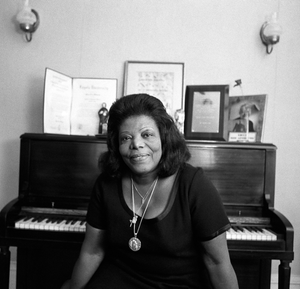When we talk about jazz, the discussion stands incomplete if we don't give well-deserving credit to the amazing women who framed its history with their contributions. One such talented woman was Mary Lou Williams.

Who is Mary Lou Williams?
Born on May 8th, 1910, Mary Lou Williams was a jazz pianist aficionado. She mainly performed in the 1940s and 50s and wrote some of the most memorable tunes to her name.
Her passion for music was evident from the early age of two when she aced the art of hitting a perfect pitch. Not only this, but she had a photographic musical memory at only four years old, all because her mother, who was a trained pianist. As a child, she would spend hours on her mother's lap as she played the piano and memorized the tunes. She was fascinated with music!
When she turned ten, she was already on a roll and performing at intimate gatherings throughout Pittsburgh. Soon, she grew in popularity, and by the age of 12, she had her dream debut in 1922. Her first major performance was when she played piano in a travel show, the Buzz and Harris Revue.
By 1925, she worked as a musician as her ultimate profession and devoted her entire life to jazz's development. It’s safe to say that from the early 1920s to the 1970s, she actively participated in each era of jazz.
She is popular for her remarkable contribution to the industry, as she also made music arrangements for several other legendary artists, including notable names like Duke Ellington, Earl, Cab Calloway, Tommy Dorsey, and Benny. She soon became one of the most well-known and sought-after music composers.
It was 1942 when she truly revolutionized the jazz industry. She founded a band in NYC which managed to bring in a new pool of audiences to the world of jazz. All thanks to her modernized take on the genre!
Was It Easy For Her to Make A Name For Herself?
Struggle and challenges in the professional world are nothing new. But when it comes to making a mark as a woman in a male-dominated music industry, it can get really tough in a genre like jazz.
It’s widely known how African-American musicians faced many challenges receiving recognition at first, and although Europe was a bit more receptive, it wasn’t easy for a woman to make a mark in jazz, either.
For Mary Lou, it’s true she garnered appreciation across the world and was in high demand for her exceptional mastery when it came to jazz, however, the praise was often ambiguous.
For example, Hugues Panassie, a French critic, was in awe of Mary Lou's debut performance. While he appreciated the passion she had for her craft, he, on the other hand, believed that she was so fine that people might even not believe that it was a woman playing!
Last Years
There came a time when after tirelessly devoting herself to the craft, she felt truly burnt out. She could not tolerate mishandling at the hands of her husband and constant abuse by club owners. Everything mounted the extent that she stepped down amid her performance in Paris in 1954. It wasn’t until 1957 that she returned to music.
She put herself in what you might call self-imposed exile and chose to spend time in the church. Even then, she began producing liturgical music, popularly known as Mary Lou William's Mass.
Death
Mary Lou Williams succumbed to bladder cancer and died in 1981. In addition to her outstanding contribution to the jazz industry, she left Mary Lou William Foundation to further jazz's development. We remember her today and always! Thank you for your outstanding contributions, Mary Lou.
Join me in celebrating women in music by listening to my album: www.maggysimonsings.com/music
With Love, Maggy
